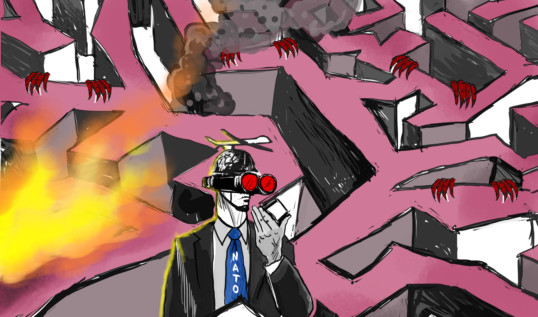
In the aftermath of the Nato summit last week, which was held in Wales and attended by leaders and representative of more than 60 nations, US President Barack Obama announced that the alliance members had unanimously agreed on the need for immediate action against Islamic State of Iraq and the Levant (Isil) militants. US Secretary of State John Kerry said a core coalition, comprising ten nations, will work to stop the flow of foreign fighters, cut off Isil funding and delegitimise its ideology. The 10 nations are the US, Britain, France, Germany, Canada, Australia, Turkey, Italy, Poland and Denmark. The group does not include any Arab nation and only one of Iraq’s six neighbours. However, reports indicated that the coalition would rely on support from key regional allies such as Jordan, which would provide intelligence and logistics, and Saudi Arabia, which would supply essential funding.
Not since the US formed an international coalition, post 9/11, to wage war on Al Qaida — in what became known as the international “war on terror” — did such a large group of nations commit themselves to work together to stem the tide of a new regional and international threat. But while Kerry made it clear that the US planned to “degrade and destroy Isil capabilities and ensure that it can no longer threaten Iraq, the region, and the world, he said that no foreign troops would be committed and that there was an agreement that there would be “no boots on the ground”. Instead, the coalition would “bolster the Iraqi security forces and others in the region who are prepared to take the militants on”. Since last month, the US air force has been launching strikes against Isil positions in northern Iraq and providing air cover to Kurdish and Iraqi forces that have been fighting Sunni extremists.
There is no doubt that the countries of the region are in agreement over the growing threat of Isil. Saudi King Abdullah Bin Abdul Aziz told foreign emissaries last month that Isil threatened both Europe and the US. The atrocities committed by the movement in both Iraq and Syria, especially against religious and ethnic minorities, have forced regional players to change their priorities and adjust their agendas. We are witnessing a possible thaw in relations between Saudi Arabia and Iran, both of which now back efforts to launch a new political process in Iraq that seeks to appease the country’s Sunni minority.
And the US and its western allies are now revising their Syria policy as well by admitting the need to arm and support moderate Syrian rebels, namely the Free Syrian Army (FSA), which has vowed to fight Isil and dislodge it from areas under its control. The Syria factor is an important one since it poses a challenge to the international coalition and regional powers. Isil now dominates most of eastern Syria and its fighters in Iraq can find safe haven there if forced to retreat. The pressing question is how to deal with the regime of Syrian President Bashar Al Assad? The Damascus government is also fighting Isil militants and incredibly, its armed forces are still strong enough to battle this vicious foe. However, the West considers Al Assad as part of the problem and attributes his atrocities against Syria’s Sunnis as one important factor behind empowering Isil in Syria.
Two weeks ago, Obama was lambasted for admitting that he had no strategy to battle Isil. Today, there is a coalition that is bent on working together to destroy this menace and Obama has said that there is a need to go beyond western countries and include Sunni majority states, in order “to reject the kind of nihilism that Isil projects”.
But will this new strategy work? More than a decade of fighting in Afghanistan and elsewhere has degraded Al Qaida’s capabilities, but the organisation is far from dead. It remains active in Yemen, Somalia, Libya and regions in western Africa. Al Qaida’s leader, Ayman Al Zawahiri, has just announced the creation of a new branch in the Indian sub-continent.
For the Iraqis to succeed in chasing Isil militants away, a new political deal will be required across the board. Iraq’s Sunnis remain sceptical of the new government that Haidar Al Abbadi is trying to form. It will take a lot of assurances for the Sunnis to rise against Isil in Iraq. The same conundrum is present in Syria, where the Al Assad regime refuses to budge and has not offered a way out of a complex political gridlock.
Aerial bombardment by itself will not undercut Isil presence and influence. Extremists are the by-product of many years of flawed policies and the absence of social justice and inclusive gestures. There is a dire need to address the core issues of the region and this will take time. Dealing with the phenomenon of foreign jihadists coming from Europe and the US will not be easy. It will continue to challenge the West for many years to come. In the end, the core coalition will succeed in weakening and even destroying Isil. But the root-cause of the problem will remain. This is the true challenge for the region and the world — one that will require innovative solutions that go beyond the mere use of force.
Osama Al Sharif is a journalist and political commentator based in Amman.








